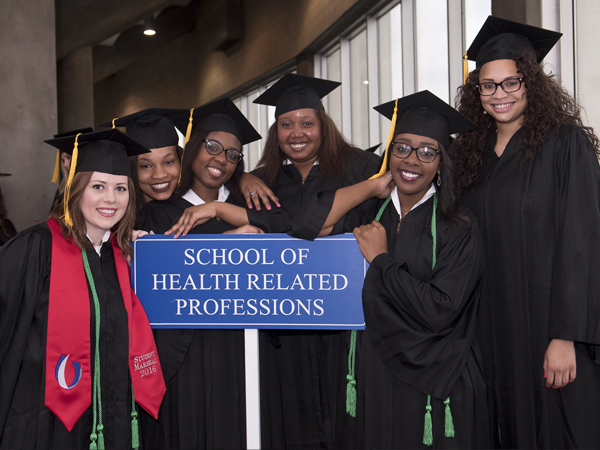Commencement marks end of era for cytotechnology program

Ninety percent of cytotechnologists employed in Mississippi, and all of those employed at the Medical Center, received their training at the School for Health Related Professions. The positive impact they've had on the health of women in the state is undeniable.
However, the Bachelor of Science in Cytotechnology program graduated its final class last month. Due to advances in technology and changes in screening guidelines that have had drastic effects on the field, the program is no longer accepting new students.
In the 1960s the outlook changed for women's reproductive health. The American Cancer Society (ACS) publicly promoted a test developed by George N. Papanicolaou in the '20s, and doctors in the United States began routinely testing women for early cervical cancer, reducing the cervical cancer death rate today by 70 percent, according to the ACS.
The test was the Pap smear, and the birth of a new career - cytotechnology - brought with it the decline of cervical cancer deaths.
The cytotechnologist analyzes the Pap stained smears under a microscope to detect changes in size and shape and slight variation in the nucleus and cytoplasm of cells to judge whether or not the patient has pre-cancerous or cancerous cells. It is meticulous work and requires independent decision-making skills.

The Mississippi State Board of Health had plans to begin a screening program for detection of early cervical cancer and precancerous lesions, recognizing the state's large population of high risk patients. The original program, organized and directed by Drs. Carl G. Evers and Roger B. Arhelger, was partially funded through a U.S. Public Health Service home training grant.
Dr. Zelma Cason, professor of cytotechnology and the Medical Center's chief cytotechnologist for 29 years, was the first graduate of the six-month certificate program and became the program director and educational coordinator in 1971. After the program was reaccredited in 1979, increased demand for cytotechnologists trained in areas such as aspiration cytology, histotechnology and cytogenetics, led to the training program being upgraded to a Bachelor of Science degree. The first class in the bachelor's program enrolled in August 1981.

In its 50-year history the program has graduated 247 students to work in the field of cytotechnology. Forty of those have taken supervisory roles in cytopathology laboratories and clinics across the U.S. Class of 2015 alumni Tanita Parshotam, I-Chun Chen and Ciara Frizzell hold positions at Baylor College of Medicine, Ochsner Medical Center and Mayo Clinic respectively.
Another of the graduates from the program is Kenneth Heard, assistant professor of cytotechnology and former UMMC chief cytotechnologist. Heard finished the bachelor's program in 1991. Heard and Cason will both retire at the end of June.

“These two individuals in the cytotechnology program have the equivalent of 75 years of experience,” said Dr. Hamed Benghuzzi, professor of clinical health sciences at SHRP. “They made a huge difference in the state of Mississippi in preventing and diagnosing early cervical cancer and endometrial dysfunction.”
The final graduates of the program walked in the commencement ceremony on Friday, May 27. The class included Fa'Jada Bobo, Laneisha Jackson, Keteria Jones, Tameka Jones, Meisha Ross and Kayla Smith.
For many students, a degree in cytotechnology serves as a stepping stone to other health-care related fields. Ross said she has plans to pursue an MBA after she successfully sits for her CT(ASCP) boards. She wants to open her own pain management clinic when she completes her education. She said that the program has taught her a lot in a short amount of time.
“It taught me to be patient and that I know my materials,” said Ross. “Dr. Cason has helped me out tremendously too. Dr. Tucci and Mr. Heard - I'm going to miss them so much.”


